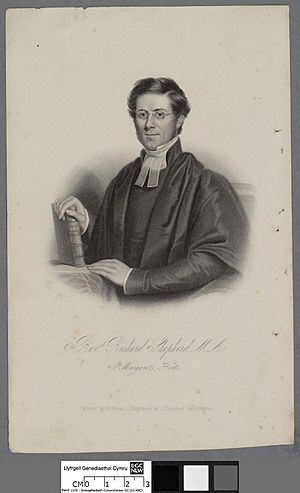Richard Shepherd (theologian) facts for kids
Quick facts for kids
Richard Shepherd
|
|
|---|---|
 |
|
| Born | 1732 |
| Died | 1809 (aged 76–77) |
Richard Shepherd (born around 1732, died 1809) was an important English churchman. He was known for his religious work and also for writing poems. In 1783, he became the Archdeacon of Bedford, which was a significant role in the Church of England.
Contents
Richard Shepherd's Life
Richard Shepherd was the son of Henry Shepherd, who was a vicar (a type of priest) in Mareham-le-Fen, Lincolnshire. When Richard was seventeen, in 1749, he started studying at Corpus Christi College, Oxford. This is called "matriculating."
His Education and Early Career
He earned several university degrees:
- B.A. (Bachelor of Arts) in 1753
- M.A. (Master of Arts) in 1757
- B.D. (Bachelor of Divinity) in 1765
- D.D. (Doctor of Divinity) in 1788
These degrees show how much he studied and learned. In 1760, he became a "probationary fellow" at his college. This meant he was a junior member of the teaching staff.
From Military to Church
Richard Shepherd first thought about joining the military. However, he decided to become a priest in the Church of England instead. He lived in Oxford for many years.
In 1783, he became a chaplain (a religious advisor) to Bishop Thomas Thurlow. Bishop Thurlow then appointed him as the Archdeacon of Bedford. This was an important position in the church.
Royal Society and Lectures
On May 10, 1781, Richard Shepherd was chosen as a Fellow of the Royal Society. This is a very old and respected group for scientists and thinkers.
In 1788, he gave special lectures at Oxford called the "Bampton Lectures." He published these lectures as a book titled Ground and Credibility of the Christian Religion. He also published more talks in 1792.
Later Life and Death
In 1792, Lord-chancellor Edward Thurlow, 1st Baron Thurlow gave him two church jobs. Richard became the rector (head priest) of Wetherden and Helmingham in Suffolk. He held these jobs until he passed away.
Richard Shepherd died in Wetherden on January 3, 1809. He was 77 years old.
Richard Shepherd's Writings
Richard Shepherd wrote many books and poems. Besides his sermons (religious talks), here are some of his notable works:
- Ode to Love (1756): An "ode" is a type of poem. This one was later called The Philologist.
- Review of a Free Enquiry into the Nature and Origin of Evil (1759): This was a review of another writer's ideas about good and evil.
- Odes, Descriptive and Allegorical (1761): More poems that described things or used symbols.
- The Nuptials, a didactic Poem in three books (1761): A "didactic" poem teaches a lesson.
- Hector, a dramatic Poem (1770): A play-like poem.
- Bianca, a Tragedy (1772): A "tragedy" is a serious play with a sad ending. Many of his early works were put together in a collection called Miscellanies in 1776.
- Reflections on Materialism (1779): Thoughts on the idea that only physical matter exists.
- Examination of the Socinian Exposition of the Prefatory Verses of St. John's Gospel (1781): A detailed look at a specific religious interpretation.
- Essay on Education (1782): An essay sharing his thoughts on how people should be educated.
- Polyænus's Stratagems of War (1793): This was his translation of an ancient Greek book about war strategies. He had worked on it for over 30 years!
- Notes on the Gospel and Epistles of St. John (1796): Notes and comments on parts of the Bible.
- The new Boethius; or of the Consolation of Christianity (1806): A book offering comfort through Christian beliefs.
- Religious Union perfective, and the support of Civil Union (1807): A book about how religious unity helps society.
- No False Alarm, or a Sequel to Religious Union (1808): A follow-up book to his ideas on religious unity.

